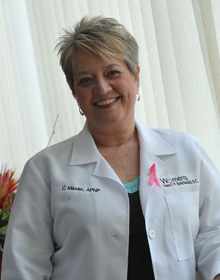 By Connie Masak, APNP
By Connie Masak, APNP
We often get asked this question, “I’ve read that I don’t need a yearly pap smear, so why do I need to come in for an exam?”
There is a lot of confusing information out there, so let me try to clarify for you.
In 2012, the American Congress of Obstetricians and Gynecologists updated the cervical cancer screening (pap) guidelines. The new guidelines are based on your age and pap smear history. It’s true that you may not need yearly pap screening, but your yearly exam is so much more than “just a pap.”
Your annual exam is really a well-woman’s exam. It is an excellent opportunity for you to ask questions that you may be uncomfortable asking elsewhere. You can also receive the latest information on maintaining a healthy lifestyle and minimizing health risks. In addition, it’s a chance to discuss birth control options, menopause, or STI concerns, as well as to ask sexual or general health questions.
Before your appointment, we recommend that you write down a list of questions (a suggestion, not a requirement). After all, if you can’t ask us, who can you ask? When you arrive for your appointment, you should be able to tell us the first day of your last menstrual period. We also recommend that you avoid douching, vaginal medication, and intercourse for 48 hours before the exam.
Your well-woman visit will begin with a review of your health history, sexual history, and medications, along with measurements of your weight, blood pressure, and body mass. The exam itself consists of heart and lung assessment, palpation of the lymph nodes, a clinical breast exam, examination of the abdomen, and a pelvic exam. The pelvic exam evaluates the external and internal pelvic organs including the vulva, vagina, cervix, ovaries, uterus, and fallopian tubes. Unless you are having problems, your first well woman exam should start at age 21.
So you see, your annual exam is much more than “just a pap.” It’s a way to take control of your body and your health!
You should see your gynecologist ANYTIME you
- have abnormal vaginal bleeding
- have severe pain in your lower abdomen
- have unusual vaginal discharge or irritation
- have been in contact with a sexually transmitted infection or have STI concerns
- notice breast lumps, breast discharge, or a change in the size of your breasts
- have blood in your urine
- are planning to become pregnant or are pregnant
We encourage you to call (920) 749-4000 with any questions or concerns. That’s why we’re here!